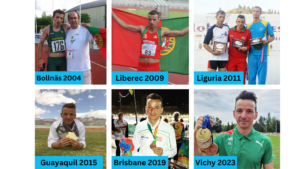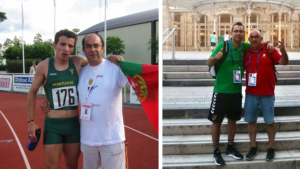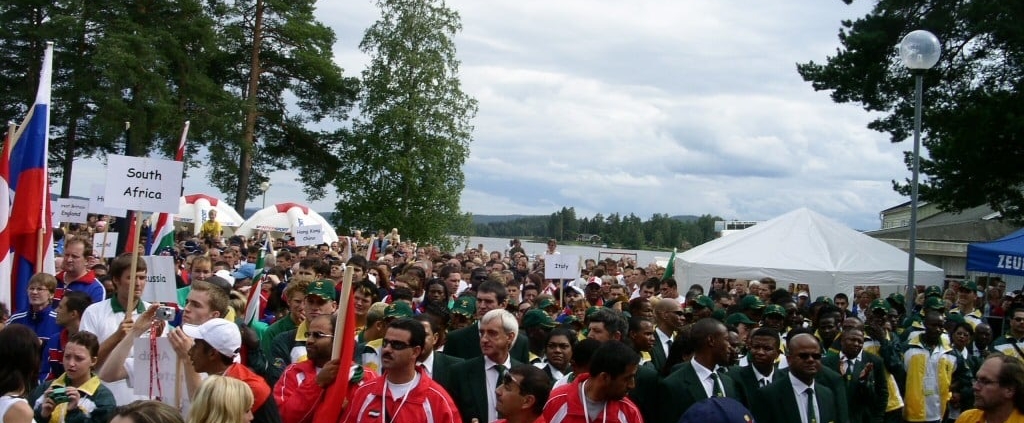Remembering Bollnäs 2004 – the 20th anniversary of the first Virtus Global Games
This week marks the 20th anniversary of the first Virtus Global Games, held in Bollnäs, Sweden, in 2004. From its modest beginnings to becoming the pinnacle of elite sports events for athletes with intellectual impairments, the Global Games have grown tremendously, showcasing athletic prowess and inclusivity on a global stage.
In 2004, Bollnäs hosted athletes from 29 countries, including Australia, Brazil, Chinese Taipei, Czech Republic, Estonia, France, Finland, Great Britain, Greece, Germany, Hong Kong, Hungary, Iceland, India, Iran, Italy, Japan, Mexico, Netherlands, Poland, Portugal, Puerto Rico, Russia, South Africa, Spain, Sweden, Ukraine, Venezuela, and the United Arab Emirates. Competitors strived for medals in a single competition class- II1 for athletes with intellectual impairments.
Poland dominated the medal tally with 50 medals (26 gold, 14 silver, and 10 bronze), followed by Australia with 44 medals (11 gold, 16 silver, and 17 bronze), and Hong Kong with 27 medals (8 gold, 12 silver, and 7 bronze).
Since 2004, the Global Games have expanded significantly. The sixth edition, held last year in Vichy, France, saw over 900 athletes and coaches from 47 nations participating, marking the largest medal program in Virtus history. The event featured 13 sports, including athletics, basketball, cycling, equestrian, futsal, handball, judo, karate, rowing, swimming, table tennis, taekwondo, and tennis. The inclusion of karate, judo, and equestrian sports enhanced the diversity of the competition.
France topped the medal tally at GG2023 with an impressive 189 medals (88 gold, 56 silver, and 45 bronze), followed by Australia with 125 medals (42 gold, 41 silver, and 42 bronze), and Italy with 87 medals (30 gold, 27 silver, and 30 bronze).
For the first time, the competition was open to all three classes: II1 for athletes with intellectual impairments, II2 for athletes with intellectual impairments and additional impairments, and II3 for athletes with autism. The II2 class was introduced at the 2019 Global Games in Brisbane.

Photos of Lenine Cunha from all six Global Games. Photo Credit: Lenine Cunha
Lenine Cunha, a Virtus Ambassador and Paralympic bronze medallist, reflected on the Games’ growth:
“I have competed across all six editions of the Global Games and I’ve seen it getting bigger every time. I have seen so many new athletes making their debut at the games and winning so many medals.”
“The Global Games literally saved my life and I want to thank INAS/Virtus for initiating the Global Games, which is the biggest elite competition for athletes with an intellectual impairment. It is like the Paralympic Games where many sports are offered as competition events which you cannot find in any other games.”

Kelly Wren with her teammates at Bollnäs 2004 (third one from right in the first photo) and at Brisbane 2019 (posing in the middle). Photo Credit: Kelly Wren.
Australian tennis player Kelly Wren, another athlete who has participated in all editions, expressed her excitement about the diverse experiences:
“Every time I went to the Global Games, I had different experiences. I saw the way the local people live in different countries. I visited so many beautiful places and made so many international friends.”
“The GG2019 was very close to my heart as my parents, coach, and friends could see me play. They flew from different cities to Brisbane to watch me. There are two new competition classes now as compared to earlier, the doors opened for athletes with Down syndrome and autism which led to an increase in several athletes.”
“I want to see the Global Games grow big with every edition and create pathways for the Paralympic Games in more sports rather than just in athletics, table tennis, and swimming.”

Jose Pereira at Bollönas 2004 (L) and Vichy 2023 (R). Photo Credit: Jose Pereira
Jose Costa Pereira, Virtus Athletics Sports Director, who has been with the organization since the beginning and also happens to be the one who coined the name ‘Global Games’ , shared how the games have allowed thousands of athletes with intellectual impairment to showcase their talent on a global stage. Remembering his early days within the organization, Jose says,
“I could possibly belong to the oldest group of people who have been associated with Virtus’s movement, I have seen INAS-FID change into Virtus, I have been to all the Global Games and have seen it grow in all aspects such as the number of athletes, number of competition class and sports from Bollnäs 2004 until Vichy 2023.”
“We welcomed two new competition classes- II2 for athletes with an intellectual disability and significant additional impairment and II3 for athletes with autism in Brisbane 2019 and Vichy 2023 respectively that helped us in becoming more inclusive for people with intellectual impairment.”
“Global Games has become like the Paralympic Games for athletes with intellectual impairments whose sports or classes are not included at the Paralympics. Some so many athletes have found new purpose in life through the games and we are proud to be able to offer this elite-level competition”
As Virtus celebrates the 20th anniversary of the first Global Games, the future looks promising. The Games continue to provide a platform for athletes with intellectual impairments to showcase their talents, foster international friendships, and promote inclusivity in sports. With each edition, the Global Games not only grow in scale but also in their impact, inspiring athletes worldwide and paving the way for greater participation in the Paralympic Games.




